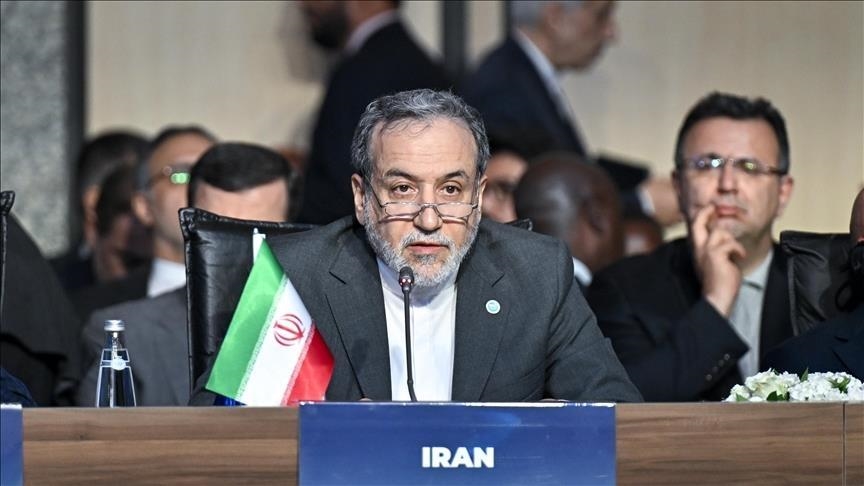Iran reaffirms support for Hezbollah amid disarmament push
Lebanon’s foreign minister condemns Iranian statements as ‘unacceptable interference’ in its internal affairs

ISTANBUL
Iran voiced strong support for Hezbollah on Wednesday following a Lebanese government decision to disarm the group, stressing that Tehran plays no role in shaping its decisions.
Speaking in a televised interview, Foreign Minister Abbas Araghchi said disarmament attempts are not new and stem from Hezbollah’s growing strength on the battlefield.
“This is not the first time they’ve tried to strip Hezbollah of its weapons,” Araghchi said. “The reason is clear: the power of resistance has proven itself in the field.”
He added that some believed the group’s recent battlefield losses could pave the way for renewed efforts to dismantle its military capabilities, “but Hezbollah’s firm stance, reflected in its leader’s response and the latest statement, showed the group is standing strong and unyielding.”
Araghchi said key Lebanese Shia figures and movements, including the Amal Movement and Parliament Speaker Nabih Berri, had reaffirmed their full backing for Hezbollah, saying: “Today, the Shia current in Lebanon is at the peak of its power.”
According to the Iranian official, Hezbollah has “fully recovered from the blows of the war, reorganized its forces, and replaced commanders as needed.”
He emphasized that Iran maintains a policy of non-interference in Hezbollah’s decision-making: “We support any decision the group makes, but we do not intervene.”
The remarks sparked swift condemnation from Lebanese Foreign Minister Youssef Raggi, who said Araghchi’s statements constituted “an unacceptable interference” in Lebanon’s internal affairs.
“The recent remarks by Iranian Foreign Minister Mr. Abbas Araghchi, in which he addressed internal Lebanese affairs that are in no way the concern of the Islamic Republic, are firmly rejected and condemned,” Raggi said on X.
“Such statements undermine Lebanon’s sovereignty, unity, and stability and constitute an unacceptable interference in its internal matters and sovereign decisions.”
He added that bilateral relations must be based on “mutual respect, equality, non-interference in domestic affairs, and full adherence to the decisions of legitimate constitutional institutions.”
“It is completely unacceptable for these relations to be used to promote or support domestic actors outside the framework of the Lebanese state and its legitimate institutions or at the expense of the state itself.”
The diplomatic exchange comes as Lebanon’s government moves forward with a plan to limit all arms possession to the national army by the end of the year, a move Hezbollah has strongly rejected as politically motivated and aligned with Israeli and US pressure.
Lebanese Prime Minister Nawaf Salam has ordered the military to prepare an implementation roadmap for the plan, while President Joseph Aoun unveiled a broader national proposal, including Israeli withdrawal, prisoner releases, and full state control over arms.
Hezbollah has termed the push a “grave sin” and is dismissing it “as if it doesn’t exist.”
Cross-border warfare between Israel and Hezbollah began in October 2023 and escalated into a full-scale war in September 2024. As many as 4,000 people, including Hezbollah chief Hasan Nasrallah, were killed and around 17,000 others injured.
A ceasefire was reached in November, but Israeli forces have conducted near-daily attacks in southern Lebanon, claiming to target Hezbollah activity.
Under the truce, Israel was supposed to fully withdraw from southern Lebanon by Jan. 26, but the deadline was extended to Feb. 18 after Tel Aviv refused to comply. Israel still maintains a military presence at five border outposts.
Cross-border warfare between Israel and Hezbollah began in October 2023, and escalated into a full-scale war in September 2024. As many as 4,000 people including Hezbollah chief Hasan Nasrallah were killed and around 17,000 others injured.
A ceasefire was reached in November, but Israeli forces have conducted near-daily attacks in southern Lebanon, claiming to target activities of Hezbollah.
Under the truce, Israel was supposed to fully withdraw from southern Lebanon by Jan. 26, but the deadline was extended to Feb. 18 after Tel Aviv refused to comply. Israel still maintains a military presence at five border outposts.
Anadolu Agency website contains only a portion of the news stories offered to subscribers in the AA News Broadcasting System (HAS), and in summarized form. Please contact us for subscription options.







